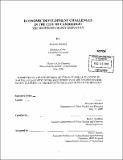Economic development challenges in the City of Cambridge : the biotechnology industry
Author(s)
Mitchell, Brandon, 1963-
DownloadFull printable version (6.969Mb)
Other Contributors
Massachusetts Institute of Technology. Dept. of Urban Studies and Planning.
Advisor
Karl F. Seidman.
Terms of use
Metadata
Show full item recordAbstract
Despite its reputation as one of the most entrepreneurial places on earth and its abundant resources, some firms in the hi-growth biotechnologyI sector have either left Cambridge 2 or, are considering leaving the City. The reasons why new biotechnology firms locate in Cambridge are well understood and conform to prevailing location theories; A highly skilled and educated labor force, as well as the proliferation of new technology from MIT, Harvard and mature biotechnology firms. At present, Cambridge is home to 62 of the 240 firms located in Massachusetts. However, over time the City's share of biotechnology firms has dropped from 32 percent to 26 percent. The scarcity of lab/office space in Cambridge may be among the primary reasons that firms relocate or establish operations in cities other than Cambridge. Of primary interest is how fast growing firms with dynamic demands for lab space negotiate its scarcity. Of particular interest is how firms that have yet to garner a net positive return confront their choices including subletting, incubation and shared labs. The central hypothesis is that despite Cambridge's overwhelming location advantages, and the near necessity of operating in the City, fast growing, unprofitable firms will actively search outside of Cambridge for flexible lab/office sites. Thus, this research evaluates the principles that inform the City's relationship with the biotechnology industry, and the ensuing roles Cambridge plays in its viability and the expansion of public goods including jobs and tax revenue. Finally, this thesis endeavors to draw broader principles and conclusions about how cities hosting volatile and fast growing industries can intervene to prevent displacement of young and dynamic firms.
Description
Thesis (M.C.P.)--Massachusetts Institute of Technology, Dept. of Urban Studies and Planning, 2000. Includes bibliographical references (leaves 80-81).
Date issued
2000Department
Massachusetts Institute of Technology. Department of Urban Studies and PlanningPublisher
Massachusetts Institute of Technology
Keywords
Urban Studies and Planning.